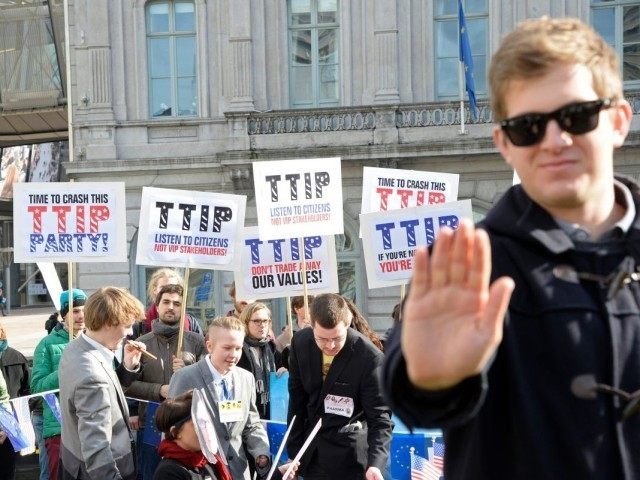Democracy in Europe, already heavily undermined by the European Union, is set to be further eroded if the U.S.-EU Transatlantic Trade and Investment Partnership (TTIP) goes ahead. Leaked documents show that the Commission has given approval for big business and the American authorities to have their say on new European legislation before the European Parliament and member states have had a chance to scrutinise it.
Negotiations on the deal have aroused a great deal of speculation as discussions between EU and U.S. dealmakers are taking place behind closed doors, while national and European Parliamentarians are allowed only strictly limited access to documents on the deal.
But suspicions that the deal was being engineered to benefit big business and the unelected Commission against the interests of the European people have been confirmed by a leaked document obtained by The Independent and the Corporate Europe Observatory (CEO) campaign group, The Independent has reported.
Nick Dearden, director of the Global Justice Now campaign group, said: “The leak absolutely confirms our fears about TTIP. It’s all about giving big business more power over a very wide range of laws and regulations. In fact, business lobbies are on record as saying they want to co-write laws with governments – this gets them a step closer. This isn’t an ‘add on’ or a small part of TTIP – it’s absolutely central.”
The document, which concerns the “regulatory cooperation” chapter of the talks, shows that the deal hands the Commission the authority to decide in which areas there should be harmonisation with the U.S., cutting EU member states and the European Parliament out of the picture.
While the document dresses the argreement up as “cutting red tape for EU firms without cutting corners,” analysis by CEO shows that it instead creates a labyrinthine network of procedures which could tie up any EU proposals that go against U.S. interests.
Kenneth Haar, researcher for CEO, said: “EU and U.S. determination to put big business at the heart of decision-making is a direct threat to democratic principles. This document shows how TTIP’s regulatory cooperation will facilitate big business influence – and U.S. influence – on lawmaking before a proposal is even presented to parliaments.”
The Commission has assured the European people that the TTIP deal is intended as a free trade deal to harmonise rules across a range of industries and policy areas including food, financial services, consumer product safety and environmental regulation. But its critics say that the agreement is anything but a free trade deal.
“There is a joke amongst economists that a real free trade agreement can be illustrated by holding up a blank piece of paper,” UK Independence Party leader Nigel Farage said, adding: “if trade is genuinely free, there are no regulations to follow.”
He said that the EU has had multiple opportunities to pursue genuine free trade, but has instead opted for harmonisation – “the imposition of uniformity – a uniformity which extends not merely to the product or service itself but to everything associated with its manufacture or provision. … And, of course, this cannot be done without a vast army of officials.”
Not only is harmonisation incredibly bureaucratic, campaigners point out that it erodes democracy and the sovereignty of all the nations signed up to the deal, by handing regulatory powers to a cartel of unelected officials and big business lobbyists.
Mr Dearden described as “scary” the idea that America could scrutinise and amend European legislation before Parliaments are even given access.
Referring to the upcoming referendum on Britain’s membership of the EU, he said: “We’re talking about sovereignty at the moment in this country – it’s difficult to imagine a more serious threat to our sovereignty than this trade deal.”
A spokesman for the European Commission said: “These accusations are unfounded and are not reflected in the EU proposal for simplifying rules for EU exporters. The text on regulatory cooperation will be published soon for everyone to see that this so-called analysis is completely false, presents a biased view of the European Commission’s work and ignores the reality of EU texts. Regulators – not trade negotiators – will continue to lead regulatory cooperation initiatives – both in the EU and the U.S.”

COMMENTS
Please let us know if you're having issues with commenting.